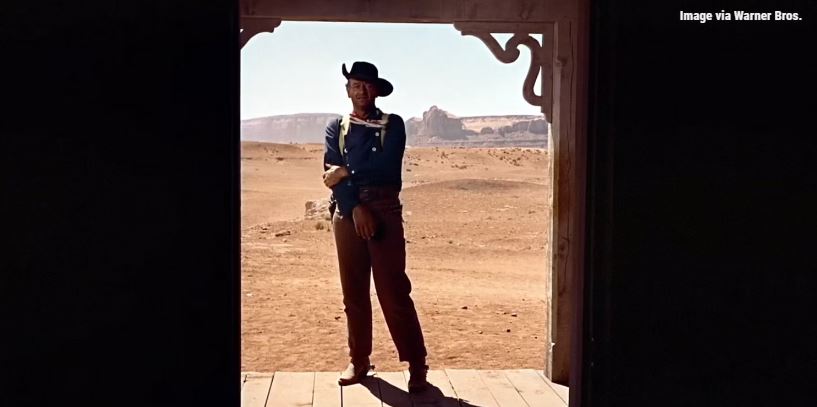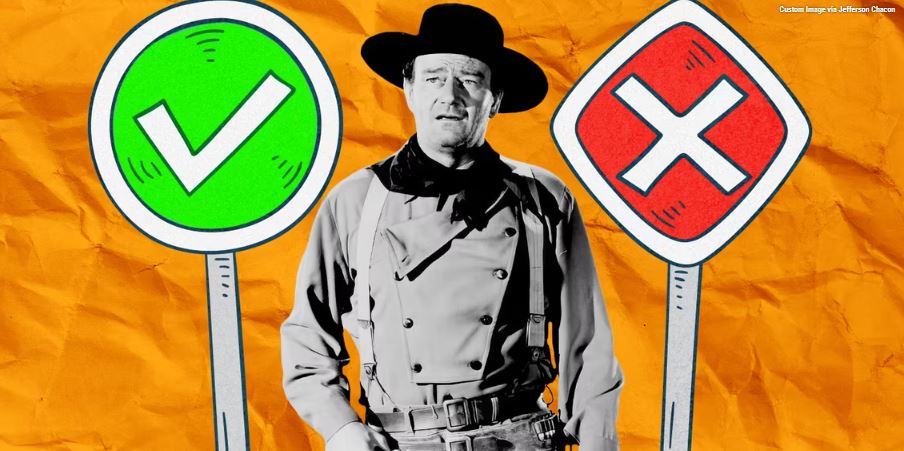There aren’t many cinematic partnerships that are quite as iconic as John Wayne and John Ford. “The Duke” starred in countless Western-centric films, but Ford’s classical storytelling techniques served as the perfect vehicle for him to succeed. Wayne and Ford made several westerns together, and have a complete understanding of the genre; 1939’s Stagecoach kicked off the Western movie craze in the United States, and 1962’s The Man Who Shot Liberty Valance served as a mature way to reflect on how the era had ended. However, The Searchers stands as the most iconic, and perhaps best, of their work together. While The Searchers is easily one of the darkest films that the pair ever worked on together, a comic book adaptation seemed to misinterpret the film’s more nuanced ideas about race relations and perpetual violence.
John Ford’s ‘The Searchers’ Is Much Darker Than You Remember

The Searchers was first released in 1956, in an era when the Western genre was as popular as superhero movies are today. Wayne had already been a Western star for over a decade, but The Searchers gave him a much different character than anything he had done previously. The former Confederate soldier Ethan Edwards has spent a lifetime killing and is looking to finally set his past aside as he visits with his brother Aaron (Walter Coy) in West Texas. Ethan is also keen to reunite with his sister-in-law, Martha (Dorothy Jordan); it’s subtly hinted that the two may have shared a romantic encounter in the past.
Although Ethan’s desire is to retire and never have to engage in conflict again, he’s drawn back into bloodshed when a Comanche tribe raids the family’s ranch. Both Aaron and Martha are killed, and their young daughter Debbie (Lana Wood) has been kidnapped. An enraged Ethan vows to find Debbie and slay her captors; the kidnapping and raid sparks a long-festering desire for vengeance within him. Although it’s an act of violence itself that unlocks Ethan’s mission, it is suggested that his bloodlust is a result of his racist feelings and psychopathic nature. Finding Debbie is only a means to an end for Ethan — the mission to rescue her is just an excuse to kill as many indigenous people as he can.
It never appears that Ford and Wayne are operating on the same wavelength with The Searchers. Wayne genuinely seems to think that Ethan is a hero, even though he proves on more than one occasion that violence is the only thing he desires. The brilliance of The Searchers is that Ethan doesn’t see himself as the villain; he’s not dissimilar from anti-heroes like Taxi Driver’s Travis Bickle (Robert De Niro), Fight Club’s Tyler Durden (Edward Norton), or The Player’s Griffin Mill (Tim Robbins). Ford makes it clear that in the end, it’s not really about rescuing Debbie. When Ethan finally finds an older Debbie (Natalie Wood), he is disgusted when he sees that she has “assimilated” into the Comanche culture, and is happy living among them.
This moment reveals the racism that actually drives Ethan. He isn’t relieved to see that Debbie is safe, and tells her that he’d rather see her dead than adapting to the Comanche lifestyle. Ethan even tries to kill Debbie before his young companion Martin Pawley (Jeffrey Hunter) stops him. The eventual conflict between Ethan and the Comanche tribe is entirely his fault — he’s so intent on “saving” Debbie from her captors that he’s willing to nearly kill her. Although Ethan eventually brings Debbie home safely, it’s only after he’s satisfied with his own bloodlust, and kills several members of the Comanche tribe. There’s no suggestion that Debbie is any happier now, the whole “rescue” was just a way for Ethan to quell his own anxieties that Debbie had “assimilated.”
Is ‘The Searchers’ Comic Accurate to the Film?

While The Searchers is clearly a study of how racism can drive characters to become violent and obsessive, the film is framed as a traditional Western adventure. This was a brilliant decision on Ford’s part, as he revealed the fundamental flaws within many traditional “hero narratives,” and how the Western genre had been dominated by white men. While this was a clever storytelling device used to analyze the genre, Ford’s subtle commentary may have slipped over some viewers’ heads. If audiences ignore Ethan’s overt racism and the irony of the film’s ending, The Searchers operates as a standard action-adventure film.
The original comic book adaptation of The Searchers certainly interpreted it that way. The comic removes many of Ethan’s remarks and deletes the powerful final scene of the film. The film closes with a dejected Ethan and Martin returning from their mission. Martin has reunited with his lover Laurie (Vera Miles), but Ethan has no one that truly loves him. It’s an ironic ending — Ethan has only hate in his heart and does not feel satisfied by the mission. Getting to “play the hero” was just a violent fantasy that hid who Ethan truly is: a lonely, miserable man whose life’s work has amounted to nothing.
The film closes with a now iconic shot of Ethan framed by a doorway, revealing just how isolated he is. He’s still “searching” for a mission because he’s not satisfied with his reality. Although The Searchers comic book may have tried to make the material work as a standard Western adventure, trying to frame Ethan as a genuine hero is actually even more problematic. Even without his racist comments, Ethan is still a violent character who purposefully puts others in danger, so he could cast himself as a hero. Even if his comments are removed, the events of the film suggest that it’s the attack on Ethan’s honor, not the kidnapping of Debbie, that drives his search.
The Searchers is easily misinterpreted due to its sweeping epicness, particularly in the gorgeous landscape shots that inspired films such as Star Wars and Raiders of the Lost Ark. However, The Searchers reveals itself to be a much darker study of the inherent ugliness of America’s Western era. Although the comic may have tried to turn it into a superhero story, Ethan’s dark impulses couldn’t be more apparent.
